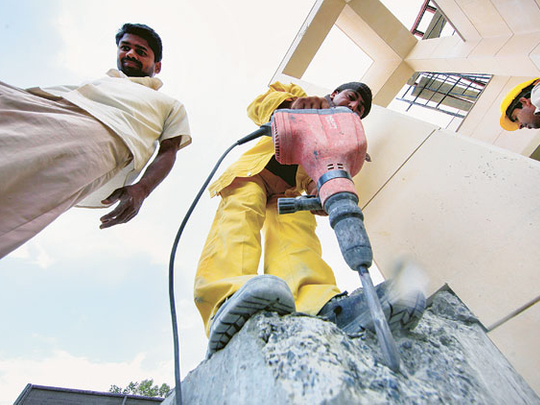
Dubai: The construction sector in the GCC is poised for a rebound, with $286 billion (Dh1 trillion) in projects set to be awarded between 2012 and 2016, according to a new research report.
A breakdown of project values to be awarded in each of the six GCC countries shows Saudi Arabia leading the pace with more than $119 billion to be awarded before 2016, followed by the UAE with $75 billion.
Elsewhere in the GCC, Oman is expected to award more than $30 billion, followed by Qatar with $26 billion, Kuwait with more than $25 billion projects up for tender, and Bahrain with $10 billion.
"There is cause for optimism in the infrastructure and construction sector. This kind of growth cannot be seen anywhere else in the world, and is still driven by huge petrodollar reserves. However, with the construction sector picking up pace, GCC economies are likely to benefit and experience a positive increase in their GDP in the next four years," Edmund O'Sullivan, chairman, Meed Events, organisers of the annual Arabian World Construction Summit, said.
Iraq beckons
Outside the GCC, there are other opportunities for contractors in Iraq, where a burgeoning real estate and transport infrastructure development agenda is under way, with spending expected to top $35 billion by end of 2012. These and many other opportunities in addition to future business plans in the region's hot markets, including Qatar, whose ambitious infrastructure development programme — estimated at $600 billion — will gather pace in preparation for the 2022 FIFA World Cup.
Meanwhile, sustainability is becoming more critical for the industry as the region moves forward. GCC governments are implementing green building codes on all construction and infrastructure projects.
With recent research valuing 2012 infrastructure projects alone (including roads, bridges, rail, sewerage, wastewater and marine) at $187.2 billion, construction companies are increasingly looking to obtain opportunities being provided to those with a commitment toward sustainable building practices.
Industry experts foresee these trends as a short-term reality that will complement growing economic opportunities, with the UAE leading the trend in the region.
Holley Chant, corporate sustainability director at KEO International Consultants, said: "I am confident that within less than five years, every market in the GCC will have sustainability-related regulations. This started in the UAE, then Qatar, and now all other GCC countries are showing signs of implementation of policies that can be classified as sustainable regulations."
"Since mid-2009, nearly every building Request for Proposal (RFP) that KEO has responded to has some form of sustainability requirement scoped in it. During project design, an integrated design team can feasibly validate energy savings of 20 to 50 per cent over a baseline building of energy use, depending on how ambitious the project is."
Chant believes that to achieve these benefits, sustainability goals must be embraced throughout design development and through to construction. "What is critical to maintain those savings is the sustainable energy strategy of the design during operation.
Need for trained FM staff
The end user must also have well trained facilities management staff who understand how to make a building perform as it was designed and commissioned to."
Tim Risbridger, head of transportation, Middle East at EC Harris, said that the Middle East is showing increased commitment to sustainability efforts and foresees this development going hand-in-hand with higher levels of opportunity in the region: "Since the global economic crisis, governments are using infrastructure, among other measures, to encourage investment and stimulate growth.
"Both Saudi Arabia and Qatar have commenced massive infrastructure investment programmes and the region as a whole is upgrading infrastructure and making significant investment. These measures ensure that significant opportunities throughout the region continue to be present."
Addressing the benefits of green building standards being imposed by governments, Risbridger said: "Sustainable construction practice is a long-term commitment, but while moving to these methods will likely incur initial costs, the investment will bring both short and long-term savings which will increase profitability."












